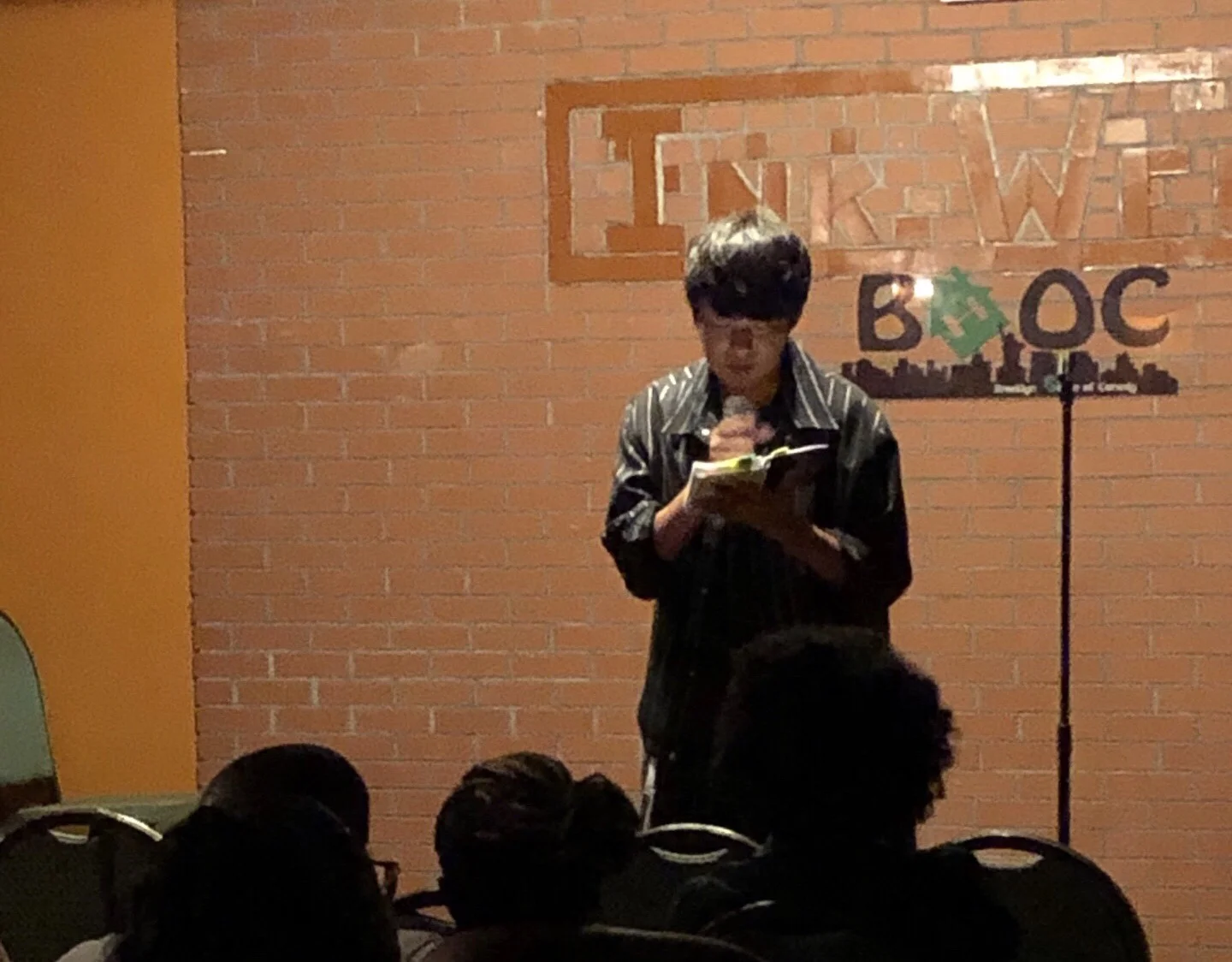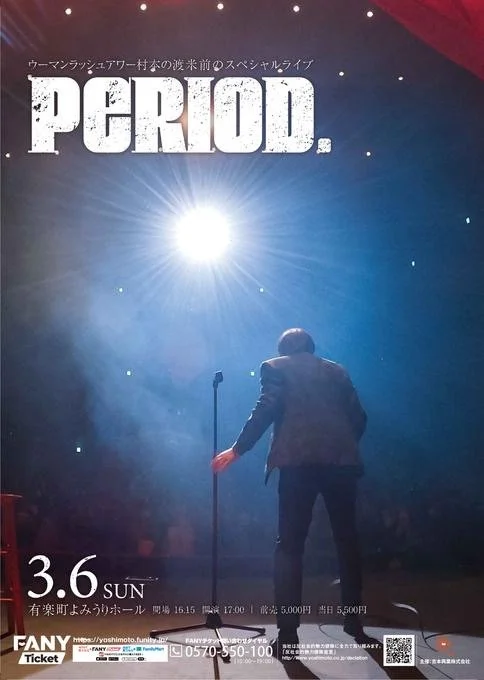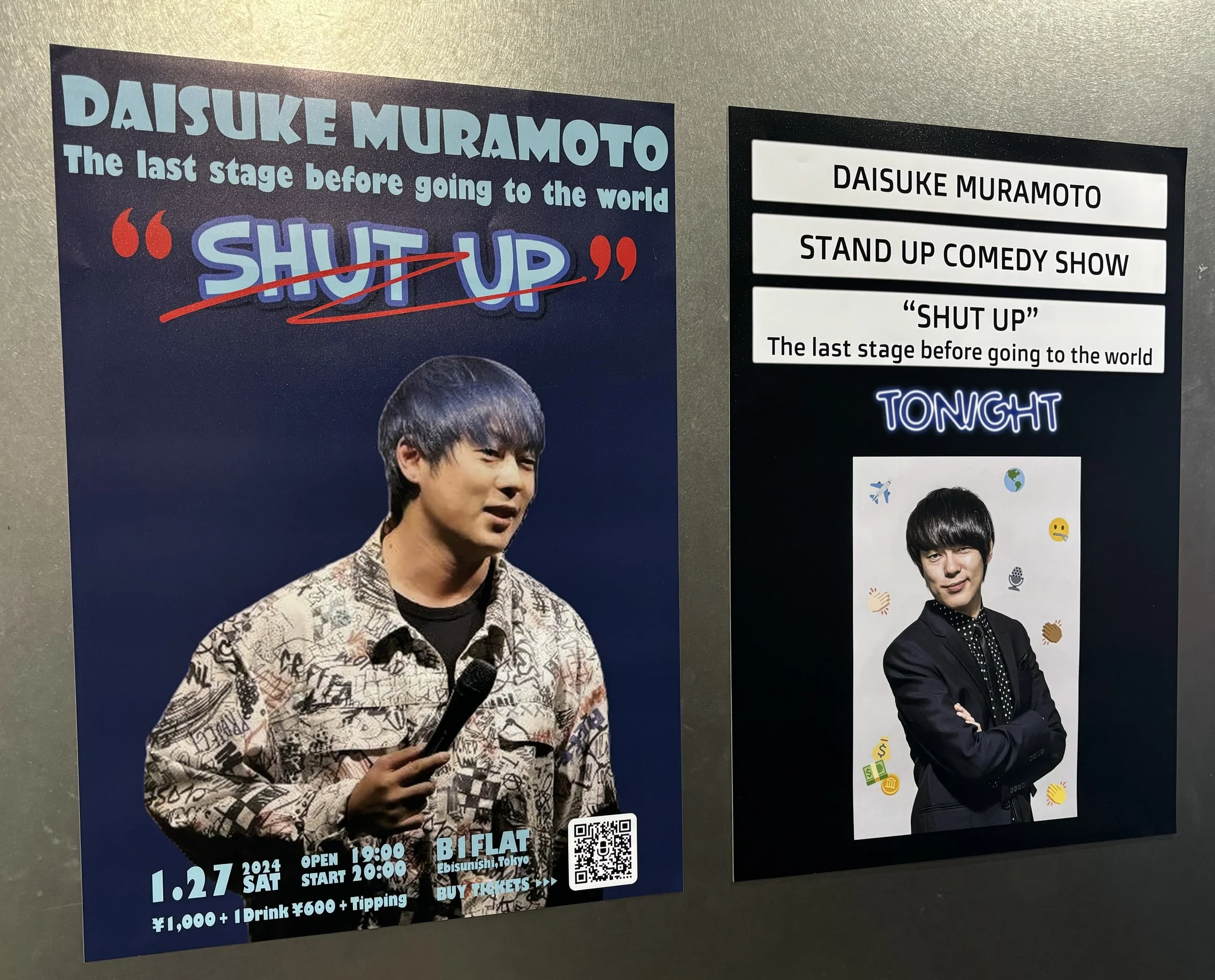In His Own Words: Muramoto Daisuke's Journey to Become a Stand-Up Comedian in the US
I’ve written about Woman Rush Hour’s Muramoto Daisuke on this site several times in the past, mostly because of his outspoken stance of performing political comedy (a rarity in Japan). Well, for the past few years Muramoto has also been attempting to become a stand-up comedian in the US. It’s an interesting story that I’ve been wanted to cover for a while, partly because I have at times helped him with translating his English material, but mostly because it’s a really an unusual story. Making comedy is hard. Really hard. Add to that writing jokes in a language you’re not native in and it just gets even harder. (This is probably why almost no one in Japan has attempted to do what he is trying to do.) What he is trying to attempt takes bravery and I admire his drive (evermore so since he didn’t even graduate from high school). However, I wasn’t really sure where to start with this story, especially since I did not have the opportunity personally to follow him abroad on his attempts to improve his English and get used to performing stand-up (a very different skill than manzai). Recently though, Muramoto returned from a month abroad and wrote an in depth blog entry covering his experiences. The entry received some attention online and after reading it myself I thought it deserved a wider (non-Japanese speaking) audience and with his permission I have done my best to translate his recount of his experience. It is long but trust me, it is worth reading to the end. So, without further ado here are his thoughts. If you want, you can find the original Japanese article here.
Muramoto Daisuke performing at an open mic night in New York in July, 2019.
Turning a Past Tragedy Into Future Comedy
I’m back from America. As I’ve written here previously, a certain television station wanted to follow me around with a camera and cover me for a month for a special program about my attempt to become a stand-up comedian in the US. However, just as I was about to get my visa, I made a comment on Twitter saying, “I think we should legalize marijuana.” The television station thought that this was inappropriate for their program and suddenly canceled the job, leaving me unemployed for a month. So, I went anyway and traveled to LA, Texas, and New York for the month of July.
In Texas, I went to an English language school in the city of Austin, living in a dormitory there. I attended one-on-one classes between a teacher and myself daily, from 2 to 5 pm. Usually, I would spend my mornings writing material, have a friend translate that into English and then go to school and have my teacher teach me how to pronounce my jokes. Because comedians use a lot of slang that are not in textbooks, I had the instructor teach me a lot of English expressions like the equivalent to Japanese words like “Yabai” and “Chou”.
One day, the teacher said, “Since they’re here, why don’t you go into the other classes and do your routine for them? That would be practice, too!” Unable to refuse, I went into a class of about twenty students and told my jokes. However, because these students were also foreigners coming to the school to learn English and especially because they didn’t understand slang they didn’t get it at all. In the end, the teacher explained each joke, eliciting responses from the students of “Ah”, “Ehh”, etc. creating an environment that was too embarrassing for a comedian like me.
There are many places in Austin, Texas where comedians can perform. Usually, in the back the bar there is a stage where musicians or comedians can test their skills, trying out songs or material. It seems that the bars, which operate on the sales from drinks sold to customers, are almost all in the red but because there is a feeling throughout the city that they cannot afford to lose these bars, which provide a vital place where artists can express themselves so they remain despite their financial difficulties. While I was in Texas I tried out my material on open mic nights several times. Every day, I would write my jokes in the morning, practice pronunciation with my teacher in the afternoon, and then test out that material among the local comedians.
One night, I was walking in Austin and heard laughter coming from a bar. Peaking in, I saw that there was a comedian on the outside terrace giving a live show. While watching the comedian, I started to wonder how much of my material would be understood. With that in mind, I went up to the host and asked, “Put me on too please.” At first he responded, “Today’s no good. Maybe next time.” but I said, “Please” and in my broken English told him one of my jokes. He laughed and said, “Okay, but only five minutes”, gave me a special introduction and let me go on.
Through the nervousness, I don’t really remember if they laughed or not but afterwards the promoter came up to me and said, “That was great! By the way, are you free on Friday? There will be more customers so why don’t you come and perform then?” So, I performed on Friday. There were a lot of customers. They laughed a lot. On the street, people came up to me said they had seen me perform. “We saw your show. It was very good! Are you on Instagram? Could you tell me your account?” We exchanged account information and then they asked, “Do you use Twitter?” Fearing that all the bad stuff I said on Twitter would be translated and understood I lied and said I didn’t. Through my performances I was able to make many friends in Austin. That’s how I spent two meaningful weeks in Austin.
After that I went to New York. The reason I went to New York was because this was the traumatic location of where, one year earlier, I performed at an open mic night and completely bombed, leaving me crying and walking around the city alone at midnight. This time I wanted to get some laughs in that New York. In order to paint over those memories I prepared a lot of jokes that I had tried out in Austin and went around to all the open mic spots. I’ve heard that New York has the toughest crowds in the world when it comes to comedy. In a city such as New York, there is one legendary club that is responsible for sending many famous comedians out into the world. It’s a place that comedians from all over the world aspire to and only the top of the top stand-ups in America can perform at. It’s said that without the recommendation of the number one and two comedians at the club you can’t even get the chance to audition.
Well, by chance, I happened to be performing at an open mic night at a bar just a 2-3 minute walk from this theater so I made sure to go by the front of it. Of course, since it was the day of a performance, all the tickets were sold out and there was a long line of people waiting for cancellations. When the doors opened and everyone filed in, as if he calculated the timing, a certain comedian came out of the employee exit. This is a comedian that I usually watch online and his appearance was not written on the announced schedule. It was probably one the cases where a comedian in the US comes into perform unannounced at a theater to test material before a TV appearance or nationwide tour. I wanted him to hear one of my jokes but I didn’t have the courage so I headed to my open mic performance. The bar was a bit small with a stage in the back and about fifty seats. In contrast to the theater, there weren’t many people. The audience, if you could call them that, was mostly the ten comedians who were set to perform. When I entered, their stares seemed to stab at me. I was the only Japanese there. Their looks seemed to say, “Who’s this guy?” It was the same kind of setting as when I completely bombed before in New York. My turn came. Then, even if I do say myself, things really went well and afterwards lots of comedians came up to me and told me, “That it was great!” I was so overjoyed. I was able to overcome my previous trauma. Unable to contain my joy, I found myself running to the famous comedy club on a sort of strange high. I wanted to run over and have the famous comedian from earlier listen to my material. Of course, it was much later and he probably wouldn’t be there. But I didn’t want to not go just because he probably wouldn’t be there. I wanted to go. More than being concerned with results, I want to take action. Unfortunately, that comedian wasn’t there but luckily another comedian who had just finished was outside smoking.
He was a comedian who was talented enough to perform at such a club. I went up to him and in my stilted English said, “I’m a comedian and I want you to listen to my jokes.” Looking like he had been accosted by someone dangerous he tried to go back to the greenroom. It was the same kind of face I would make when someone strange tries to talk to me in Japan. But that wasn’t a reason to give up. I wanted to know what he thought of my stuff. I wanted to know how one of the top comedians in New York would react. I forced him to take a look at my joke notebook and after reading it over with a clearly awkward look on his face he gave in to my enthusiasm and said, “Okay, but just one.” Then, after a moment of silence, he said, “What else?” I performed a few more for him and among those there were some that made him laugh out loud. I was so happy.
Then I heard loud applause from the club below. It must have been the reaction to the surprise appearance by that famous comedian that I saw earlier. Wanting to get a glimpse of that comedian I thanked the comedian who listened to my material and ran down the stairs to the club. The staff stopped me saying, “This show is already sold out. There will be another one in two hours and you can wait for cancellations then.” I quickly explained to him that the comedian performing now wouldn’t be in the next show and that I was a comedian who came all the way from Japan. After I showed my joke notebook to the next staff member and told him one joke he whispered into my ear, “I’ll make an exception” and let me in. As I entered, the comedian was performing stand-up and getting a lot of laughs. Filled with a mix of jealousy and admiration, I waited for the audience as the show ended. Going up to them I explained, “I’m a comedian from Japan and I want you to hear my jokes and tell me who is funnier, me or the comedians who perform here.” After doing my jokes they said, “All sorts of comedians perform here and you’re about in the middle.” I was disappointed and happy at the same time. It was a really fun time. The jokes I made were like a passport, allowing me to go here and there. This “passport” of jokes led me, someone who couldn’t do sports or study, to come out on top at a tournament deciding the number one manzai duo in Japan. It has led me to be on television, to meet directors which I love, even to the bed of a cute girl. And this time, this passport led me to America to see things that I’d never seen before. It was a month where I once again realized that power.
There were a lot of jokes I did in the US but the one that got the biggest laughs was “In Japan, I got fired from a job for just saying that marijuana should be legalized, leaving me unemployed for a month. That’s Japan. Hey Japan! You need to smoke weed once and chill out!”
Actually, when I fired from that job I thought about writing the television station’s name on SNS but I stopped myself. If I did that though that wouldn’t have been me. If I don’t find my own place in my own way I will lose myself. The manager of one theater in the US said, “The comedians that perform at my club are those that have something to say.” I was able to make jokes, unlike others, overcome my broken English with my expressions and change in the temperature of words, create a real “air” which engulfed the audience. I was able to move from a feeling of telling jokes, change anger to comedy, shout for real and have the audience explode with excitement.
But that routine would probably not get laughs a month from now. It got laughs because of the feeling of “This is what I want to say now.” Mysteriously, this always gets through to the audience. Because I held back from writing these things on SNS, I was able to express myself more strongly on stage.
One Jewish comedian who made jokes about the Auschwitz said, “Tragedy and comedy are roommates.” In moments of sadness laughter is possible. In America, black comedians make jokes about discrimination, female comedians do routines about being physically abused by men. And then there was what happened to me a month ago. Thanks to something I said, I lost a job that would have shown what I had been working on for the past three years after losing interest in being on television and started getting interested in taking my passions to the stage. This was a program that would have given me the chance to show my parents what I’d been doing and what I would like to do.
That’s why losing that opportunity was a tragedy to me. However, this tragedy led to great joy and I think of that joy as comedy. It was like seeing an Othello game board full of black pieces all flip over at once.
Being a comedian is a good job. Regarding all the Yoshimoto news someone asked, “Why is Muramoto being quiet about this?” But the truth is I’m not interested in it. I’m not a commentator on a daytime news program. I don’t plan on doing jobs on television where I eat something and give my impression of the food. I’m only concerned with what I want to say and what moves me. I don’t have enough free time to spend on “Wide Shows” (daytime news and variety programs). You never know when you are going to die and there are still rollercoasters I want to get on. That’s why my month spent in the US felt like I was running around in an amusement park.
What is race, what is religion, all these other problems, wait, these are probably superficial problems. Every day, thinking, expressing myself, getting laughs, bombing, feeling joy, feeling sadness, the night in Austin when I got my first laugh at an open mic night I walked sixty minutes from the club on the outskirts of town to my school dorm in the middle of the night. On my way home, sometimes I couldn’t contain my joy and would let out a “Ohh!” In the middle of the night in Austin, with everyone peacefully sleeping, that was already my world. Walking there, sometimes skipping, from the club to my room it felt like a victory lap.
The loss of work due to my marijuana comment gave birth to comedy. However, I was shown something more than I would have seen through that job. That tragedy became a future comedy. Those realizations led to further realizations and all of these experiences can reconstructed into comedy and brought into my world through my manzai and solo performances.






